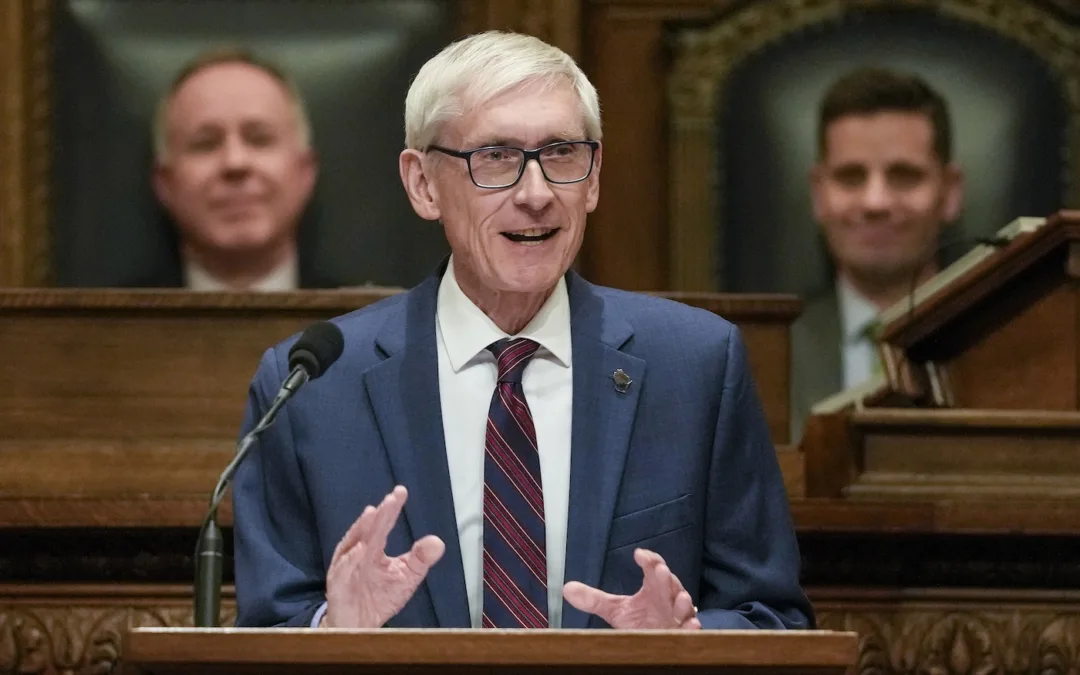
Republican leadership has sent lawmakers home for the rest of 2024 despite a lengthy legislative to-do list.
In what has become a nearly-annual occurrence at the state Capitol, the Republicans who control the Wisconsin Legislature have put the Assembly and Senate on a break within the first few months of the year—despite having full-time job status and an annual salary north of $50,000.
Lawmakers have the ability to call themselves into extraordinary session to deal with emergencies or unforeseen circumstances, but past performance indicates that’s unlikely.
So if one can assume the 2023-24 session is all but over, we can review what did and didn’t get done for Wisconsin families, farms, businesses, schools, resources, and more.
What Didn’t Get Done
PFAS Cleanup: The most recent example of legislative gridlock surrounds the issue of PFAS—or “forever chemicals”—contamination in Wisconsin’s drinking water. PFAS are a class of industrial chemicals used in a wide variety of manufacturing over a period of decades—from nonstick cookware to firefighting foam to waterproofed fabrics. Because they are manmade compounds, they don’t break down naturally once they are in the ground, or in groundwater, or in people, which makes them a health hazard.
The Legislature allocated $125 million to combat PFAS in the current state budget. Normally, that would be the end of the involvement by the legislative branch. The money would then be expended by executive branch agencies—in this case, the Department of Natural Resources (DNR)—that are staffed with experts rather than politicians. But Republican legislators are refusing to release the funds until a bill is passed that Gov. Tony Evers says would give too many polluters a “free pass” by preventing the DNR from taking enforcement action against those who contaminated a site.
“The very first thing I heard when we started talking about remediating the wells in Wausau was ‘Why are we paying for this?’” said Wausau Mayor Katie Rosenberg on UpNorthNews Radio. “Why are we on the hook for this when we clearly didn’t create the PFAS? We didn’t pollute it. We want to hold the manufacturers of products accountable if they spilled it.”
“The [state] budget passed in July, so $125 million that no Wisconsin municipality can access for PFAS is a huge chunk and the session is out, so I guess we’re waiting another year,” Rosenberg said.
Health Care: Wisconsin is now one of only three states (along with Arkansas and Idaho) that refuses to allow Medicaid to cover healthcare costs for new moms for up to one year after birth. Coverage currently runs out at 60 days postpartum, which health experts say is grossly inadequate to handle the many health challenges faced by women after giving birth. The bill passed the Senate on an overwhelming bipartisan vote, but Assembly Speaker Robin Vos (R-Rochester) refused to bring the bill up for a vote. Vos has previously disparaged Medicaid as “welfare,” when it actually covers about 40% of all births in the US.
As has also become an annual Capitol tradition, Republican lawmakers also refused to expand general Medicaid coverage—leaving Wisconsin as one of only 10 states, most of them in the Deep South, to turn down billions in federal healthcare funds to provide more stable health insurance to working families.
Surplus and Tax Cuts: Despite a record surplus that had grown to $7 billion at one point, Republicans refused to pass a tax cut plan that would pass on most of the savings to middle class families. Three different Republican packages put the bulk of the benefit into some of the state’s highest income brackets. Evers vetoed each one, including the most recent proposal that would have drained state revenue by $1.4 billion per year. Evers had asked lawmakers to pass a 10% tax credit for single filers with incomes of $100,000 or less and couples filing jointly with annual incomes of $150,000 or less—with the size of the cut phasing out at higher levels.
Child Care: Despite plaintive requests from childcare providers facing the prospect of closing their businesses, Republicans rejected Evers’ call to use part of the surplus to continue the Child Care Counts program of direct assistance that would allow providers to keep rates affordable for working families. Evers directed $170 million in pandemic relief funds to keep the program in place until June 2025. He also signed a Republican measure that increased a child and dependent care tax credit.
Absentee Ballots: There was bipartisan support for a bill that would allow some local governments to begin processing absentee ballots on the Monday before election days—a proposal widely praised as a way to reduce the number of late night tabulations and increase public trust in election results. The bill passed the Assembly, but Senate Republican Leader Devin LeMahieu (R-Oostburg) refused to bring up the bill for a vote. Evers had included the measure in his budget proposal, but Republicans removed it.
Marijuana Legalization: When it comes to legalizing marijuana, Wisconsin will remain an island surrounded by neighbors that have liberalized rules to some degree. An Assembly Republican proposal that would have brought limited legalization for medical purposes was criticized as too restrictive by some and too liberal by others. Senate Republicans objected to having state-run dispensaries, while Democrats pushed for full legalization.
Other measures that appear dead include: Evers’ workforce plan that would have expanded paid family and medical leave, recruit and train people to fill worker shortages in healthcare and education; a gun safety proposal for college campuses; reinstituting the comprehensive health and sex education programs that Republicans replaced with an abstinence-only emphasis; creation of a task force on missing and murdered Black women; and a proposal to change how new electric transmission line projects are approved across the state.
What Did Get Done
New Legislative Maps: Facing the prospect of the liberal majority on the Wisconsin Supreme Court drawing new legislative district maps, Republicans capitulated and agreed on new maps originally submitted by Evers. The move ends 12 years of Republican-drawn maps that created some of the most gerrymandered Assembly and Senate districts in the country. The change is already attracting new legislative candidates who likely would not have run under the old maps, according to Sen. Jeff Smith (D-Brunswick).
“I think we’re going to have a pretty full slate,” Smith said on UpNorthNews Radio. “It’s exciting. It’s really helpful to the voters to have choices. It’s helpful to the candidates who learn that they need to start listening to the voters and we’ve got to start working together with colleagues on the other side of the aisle.”
Stadium Makeover: Offering a reminder that some proposals remain immune from partisanship, there was strong support and strong opposition from members of both parties to a funding package that makes improvements to American Family Field, home of the Milwaukee Brewers. The ballclub then agreed to extend its lease, guaranteeing there will be major league baseball in Wisconsin until at least 2050.
Hmong Education: There was strong support for a bill that will require schools to include instructional programming about Asian Americans, especially Hmong Americans—in a state that has the third-largest Hmong population in the country. Rep. Francesca Hong, the state’s first and only Asian American state legislator, said the bill not only helps students with historical background but will help foster understanding, acceptance and inclusion.
AI in Political Ads: Lawmakers approved a measure that requires disclaimers on political advertising that includes material created by artificial intelligence (AI), designed to prevent “deep fakes” from fooling or confusing voters about a candidate’s actual position.
Judicial Security: With more than 140 threats made against Wisconsin judges in the past year, lawmakers passed a package of legislation designed to provide new privacy protections when it comes to publishing personal information and picketing near a judge’s home.
Politics

Biden administration bans noncompete clauses for workers
The Federal Trade Commission (FTC) voted on Tuesday to ban noncompete agreements—those pesky clauses that employers often force their workers to...

Opinion: Trump, GOP fail January 6 truth test
In this op-ed, Milwaukee resident Terry Hansen reflects on the events that took place on January 6, the response from Trump and other GOP members,...
Local News

Readers Poll: Top Bowling Alleys in Wisconsin
Looking for the best bowling in Wisconsin? Look no further! Our readers have spoken in our recent poll, and we have the inside scoop on the top...

8 Wisconsin restaurants Top Chef judges are raving about
Top Chef’s 21st season is all about Wisconsin, and on-screen, it’s already apparent that the judges feel right at home here. But, while filming in...





